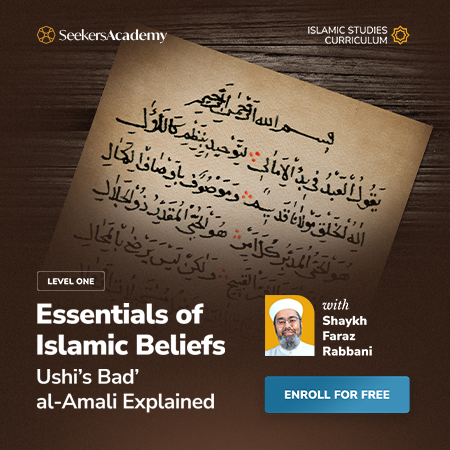
This course will cover the basics of what all Muslims must know in order to live their lives believing correctly. This includes the attributes of Allah Most High, the attributes of the prophets (peace and blessings be upon them all), transmitted beliefs and issues related to the Hereafter.
These tenets of belief are important for every Muslim to know because they relate to the very foundation of faith. Furthermore, in these times, with so much talk of different beliefs or the absence thereof, people may have influenced beliefs without realizing it. It is thus imperative to have a basic understanding of the Islamic creed.
This class will provide a good understanding of what the line is between truth and falsehood. It will allow one to understand the parameters of conceptualizing Allah and understand what to believe about the Creator and Maker of everything.
- Teacher: Shaykh Faraz Rabbani
- Know and understand the basic beliefs of Islam
- Substantiate the reasons for the Islamic beliefs
- Understand the foundations of scholarly methodology
- Appreciate the nuance and precision of the Islamic creed
- Cultivate faith and certitude
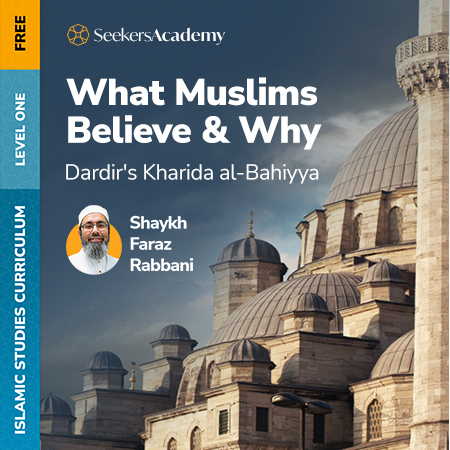
Take this course to understand the basic methods of Islamic logic and how to use them to gain evidence-based conviction in Allah Most High, His attributes, His messengers, and the afterlife. This knowledge that you will learn in this course is the context that will give your life its purpose.
- Teacher: Shaykh Faraz Rabbani
An introduction to the formal study of Islamic beliefs through a traditional manual of Islamic theology. Take this course to understand the basic methods of Islamic logic and how to use them to gain evidence-based conviction in Allah Most High, His attributes, His messengers, and the afterlife. This knowledge that you will learn in this course is the context that will give your life its purpose.
The course is an explanation of al-Kharida al-Bahiyya (“The Lustrous Pearl”), an introduction to the science of Islamic theology by the great theologian, spiritual master, and foremost Maliki jurist of al-Azhar, Shaykh Ahmad al-Dardir (d. 1201 A.H. / 1786 C.E.). The Kharida is a 71-line didactic poem that, in its own words, is “slight and small in size, but great in knowledge.”
For hundreds of years, it has been studied and memorized by beginners of Islamic theology, and is frequently quoted by students and teachers alike because of its pithy expressions. A downloadable copy of the course text in both English and Arabic is provided as part of the course materials.
- This is a second-level course in Level One.
- Before taking this course, take The Absolute Essentials of Islam (Hanafi) or The Absolute Essentials of Islam (Shafi‘i)
- Take this course before all courses in Level Two.
- Learn and use the basic logical methods of traditional Islamic theology
- Memorize the attributes of Allah Most High, His messengers, His angels, and other unseen beings
- Memorize the key events that will take place after death
- Develop evidence-based conviction in all of the above
- Understand how to turn mental conviction into spiritual certainty
- Appreciate the logical rigor of Islamic theology
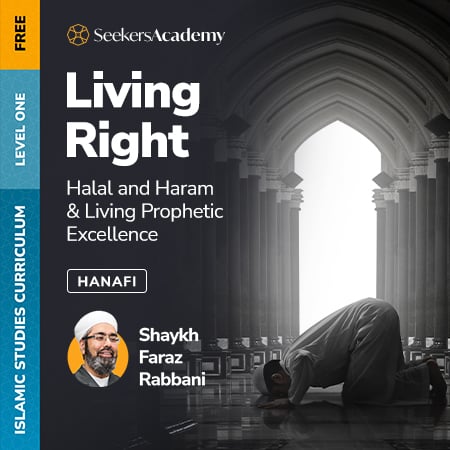
Having godfearingness (taqwa) is a prerequisite for being able to benefit from the great guidance of the Prophet (Allah bless him and give him peace).
Take this course to learn how to have godfearingness in most of the everyday situations that you are likely to encounter in your life, such as eating halal food, proper dress, interacting with the opposite gender, guarding your gaze, and guarding your tongue.
- Teacher: Shaykh Faraz Rabbani
- Appreciate the importance of the quality of godfearingness
- Memorize how to have godfearingness in dozens of everyday situations
- Improve your religious practice by keeping good company and making frequent repentance
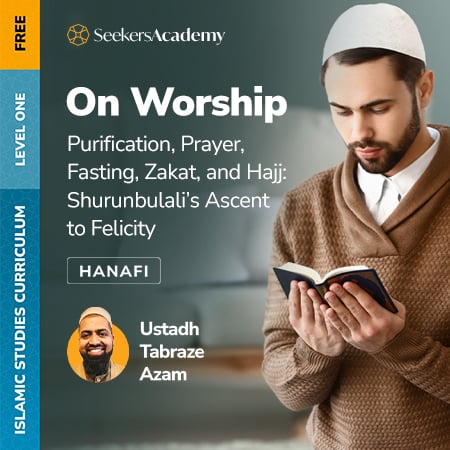
Allah Most High says, “I have not created jinn-kind nor mankind for any purpose other than to worship Me.” (Qur’an, 51:56) Take this course to get comprehensive and knowledge-based answers to all of the questions that you are likely to face in your worship
Allah Most High, all in light of a formal textbook of in Hanafi law that students like you have used for centuries. This course covers the detailed rules of Purification, Prayer, Fasting, Zakat, and Hajj. This course is taught according to the Hanafi school. If you would like to learn it according to the Shafi’i school, take this course instead.
- Teacher: Ustadh Tabraze Azam
This course is an explanation of Ascent to Felicity (Maraqi al-Sa‘adat) a concise primer on the rules of worship, slaughtering, sacrifice, and hunting according to by a leading authority of the Hanafi school, Abul Ikhlas Hasan al-Shurunbulali (d. 1069 ).
The author is best known for his more detailed introduction to the rules of worship, Nur al-Idah, and its detailed commentary, Maraqi al-Falah, which are both an essential part of every traditional syllabus in Hanafi jurisprudence. Ustadh Tabaraze Azam comments on the back cover of the book’s translation that it is “an excellent primer in Islamic beliefs and worship. . . more useful as a first complete text for those seeking understanding of the fiqh of worship than the more commonly-studied Nur al-Idah.”
- The Absolute Essentials of Islam (Hanafi) course is a pre-requisite for this course
- Those who have taken The Absolute Essentials of Islam (Hanafi) course
- Any student who wants to take level two courses in Islamic Studies Curriculum
- Understand slavehood to Allah Most High and why it is important
- Learn the rules of purification and prayer that you are likely to encounter in your daily life
- Memorize the most important rules of wudu, ghusl, prayer, fasting, zakat, and Hajj
- Appreciate the rigour of the science of Sacred Law (fiqh)
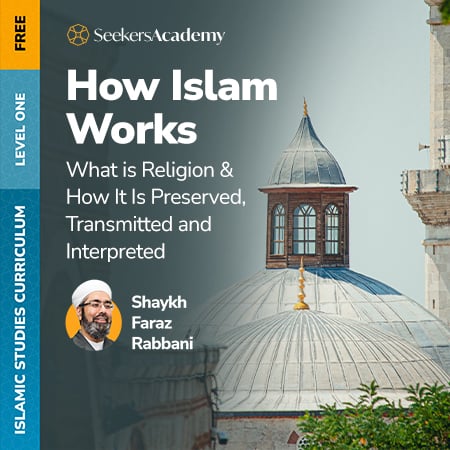
Take this course to understand how the scholars of mainstream Islam have preserved the Qur’an, the Sunna, and its understanding, from the time of the Prophet (Allah bless him and give him peace) all the way down to our times.
- Teacher: Shaykh Faraz Rabbani
- Start here to complete Level One
- This course has no prerequisites
- Understand how the Qur’an and Sunna were preserved
- Identify the scholarly tradition of mainstream Islam
- Learn how this scholarly tradition preserved the understanding of the Qur’an and Sunna
- Understand how to apply the Qur’an and Sunna in our times
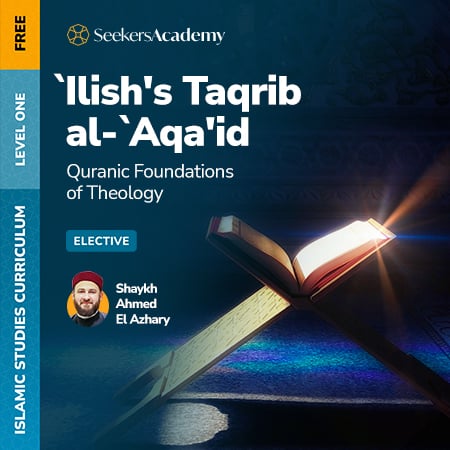
This is a Level One Course in the SeekersGuidance Islamic Studies Curriculum. It is based on an introductory primer to Islamic beliefs and theology, titled: Taqrib al-`Aqa’id al-Saniyya, written by the late-Maliki jurist and theologian Imam Muhammad `Ilish of the 19th century.
This text is considered to be one of the best introductory primers of Islamic beliefs and theology as it includes all the necessary matters of beliefs and the very basics of theology in one compact form with accessible language. Also, Taqrib al-`Aqaa’id is a very useful introduction as it connects the rational proofs of theology with their Quranic origins.
By studying Taqrib al-`Aqai’d, students will learn the foundations of Islamic beliefs, their textual evidence from the Quran, and the basics of the rational proofs that are derived from the noble verses. This course is suitable for students of knowledge beginning their journey in acquiring the sacred sciences as well as any Muslim who seeks a clear explanation of the fundamentals of belief complemented by their textual and rational proofs.
- Teacher: Shaykh Ahmed El Azhary
Taqrib al-`Aqa’id al-Saniyya bil-Adilla al-Quraniyya (also known as Taqrib al-`Aqa’id) is one of the best introductory primers of Theology. It includes all the necessary matters of beliefs and the very basics of theology in one compact form with accessible language.
One of the key benefits of this primer is that it traces the tenets of creed and the theology of Ahl al-Sunnah, particularly the Ash`ari school, to their Quranic foundations. It also includes hints to the rational proofs for the tenets of belief and how they are derived from the textual evidence - that is the verses of the Quran.
Taqrib al-`Aqa’id is authored by the late-Maliki jurist and theologian Imam Muhammad `Ilish of the 19th century. His works are amongst the last of a line of widely read and respected sources of traditional texts. Besides his long expertise and crucial contributions in Maliki fiqh, Shaykh `Ilish made valuable contributions in the realm of the rational sciences, namely Theology and Logic. Taqrib al-`Aqa’id is one of them.
- This course is for adults.
- It is particularly beneficial for students of knowledge beginning their journey in acquiring the sacred sciences as well as any Muslim who seeks a clear explanation of the fundamentals of belief complemented by their textual and rational proofs.
- It is a Level One course. There are no prerequisites for this course, but it is preferable to take it after “The Absolute Essentials of Islam” and/or “How Islam Works.”
- This course can also be taken by anyone who is interested in studying Islamic Beliefs and Kalam (Theology).
- Explain what Muslims believe about Allah Most High and His messengers.
- Learn about the essential textual evidence and rational proofs of matters of `Aqidah.
- Trace the fundamental positions of Islamic theology to their Quranic origins.
- Appreciate the work of Muslim theologians.
- Recognize the importance of rational proofs for Islamic beliefs.
- Identify the main branches of Islamic beliefs and theology.
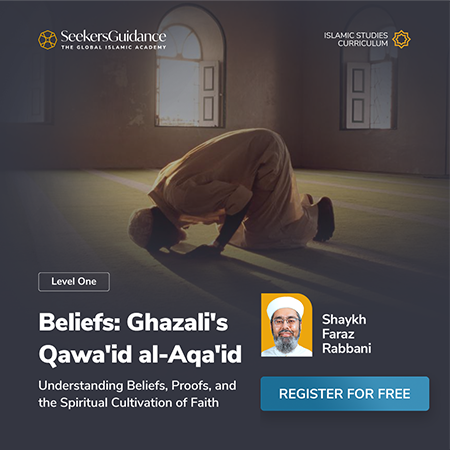
Level: Two
Instructors: Shaykh Faraz Rabbani & Shaykh Mohammed Tayssir Safi
Course Overview
This is a Level Two elective course in the Islamic Studies Curriculum.
This course covers one of the greatest intermediate-level summaries of mainstream Islamic beliefs: Book Two of Imam Ghazali’s Ihya, on the Foundations of Islamic Belief (Qawa‘id al-`Aqa’id), in full.
In his Foundations of Islamic Belief, Imam Ghazali begins in Part One with a brief statement of Islamic beliefs. Many scholars considered this summary one of the greatest summaries of the key principles of Islamic belief ever written.
In Part Two, Imam Ghazali explains how one learns and inculcates sound belief, and how faith is nurtured in the heart. He discusses a number of sensitive issues, including the relationship between the study of faith and the means of being spiritually realized in the fruits of faith. He clarifies both the importance of the study of the science of theology, but also its limitations.
Its role, he argues, is to clarify, support, and defend sound beliefs; but faith itself is truly nurtured not through mere study but through devotion to Allah. This is with the acts of turning to Allah in worship, devotion, remembrance, reflection, and acting on the guidance of the Prophet (peace and blessings be upon him).
In Part Three, Imam Ghazali covers an explanation of the Islamic belief covered in Part One. This serves as a commentary on Part One, and many central principles and key issues of Islamic beliefs are detailed and clarified.
In Part Four, Imam Ghazali explains core proofs for the beliefs that have been presented in the Foundations of Islamic beliefs. He avoids getting into detailed debates but presents what he considers the clear, strongest, and most convincing arguments for sound, mainstream Islamic theology.
The text is explained in English, but the full Arabic of Imam Ghazali’s work is read.
About the Course Text
Qawa’id al-‘Aqai’id (Foundations of Belief) is the second of the forty books of the Revival of the Religious Sciences (Ihya ‘Ulum al-Din) by Imam Abu Hamid al-Ghazali. In this book, he explains the fundamental beliefs of Islam, those that concern faith in God, His revelation, His messengers, and the Hereafter.
This presentation of beliefs goes beyond a list of creedal statements. Imam Ghazali cites the scriptural foundations in the Qur’an and hadith, refers to transmitted reports from the companions and others from the righteous predecessors, and supports these beliefs with rational arguments.
About the Author
This work was written by the greatest scholar of his time and arguably the most famous scholar of the Islamic tradition, Imam Abu Hamid Muhammad ibn Muhammad al-Ghazali. Imam Ghazali is unanimously regarded as the renewer (mujaddid) of Islam of his century, first for his intellectual defense of traditional Islamic beliefs against Avicennan philosophy, and then for his powerful spiritual reinvigoration of the Islamic sciences through his magnum opus, the 40-part lhya ‘Ulum aI-Din (Revival of the Religious Sciences).
Imam Ghazali was born in the year 450 AH (1058 CE) in Tabiran, near Tus (just north of present-day Mashhad, Iran). He first studied Islamic law at Tus and then travelled across the Islamic world taking Sacred Knowledge from its masters. One of his main teachers was Imam al-Haramayn al-Juwayni, at whose hands he became a scholar in Shafi'i law, logic, tenets of faith, debate, and the rationalistic doctrines of the philosophical schools of his time (which he was later called upon to refute). After Juwayni’s death, Ghazali was appointed to a teaching post at the Nizamiyya Academy in Baghdad, where word of his brilliance spread, and scholars journeyed to hear him.
In mid-career, after considerable reflection, he was gripped by an intense fear for his soul and his fate in the Afterlife and resigned from his post, travelling first to Jerusalem and then Damascus to engage in spiritual struggle. In Damascus, he lived in seclusion for some ten years, at the end of which he emerged to produce his masterpiece Revival of the Religious Sciences. He died in Tabiran in 505 AH (1111 CE).
Who is This Course For?
• This course is for adults.
• It is particularly beneficial for students of the sacred sciences.
• It is a Level Two course. In order to successfully complete this course, students should first take the course What Muslims Believe and Why: Dardir's Kharida al-Bahiyya or equivalent.
This course can also be taken by anyone who is interested in learning more about Islamic beliefs and their rational proofs.
Learning Outcomes:
• Understand the key principles and statements of Islamic Beliefs.
• Explain the relation between scholarly study and spiritual realization.
• Learn the importance of theology and its limitations
• Contextualize the role of theology in religious life.
• Explain Islamic beliefs and their core proofs.
• Understand the strongest arguments for mainstream Islamic theology
Course Requirements:
• Previous study of Islamic beliefs is recommended—such as the SeekersGuidance online course:
Islamic Beliefs for Seekers: Dardir’s Kharida ExplainedLesson Outline:
Lesson One: Introduction
Lesson Two: Oneness
Lesson Three: Transcendence, Life, Power, Knowledge
Lesson Four: Hearing, Seeing, Speech
Lesson Five: Actions of Allah Most High
Lesson Six: Belief in Prophets
Lesson Seven: Transmitted Beliefs
Lesson Eight: How Faith is Learned and Nurtured
Lesson Nine: Scholastic Theology
Lesson Ten: The Balanced Approach to Theology, Three Qualities for Deep Study of Theology and How to Perfect Faith
Lesson Eleven: Inward and Outward Beliefs
Lesson Twelve: The Balanced Way of Sunnism in Interpreting Unclear Texts
Lesson Thirteen: Explanation of the Creed and Proofs, Belief in Allah Himself
Lesson Fourteen: The Attributes of Negation (Part 1)
Lesson Fifteen: The Attributes of Negation (Part 2)
Lesson Sixteen: The Attributes of Negation (Part 3)
Lesson Seventeen: The Attributes of Negation (Part 4)
Lesson Eighteen: Ten Principles Related to the Attributes of Allah Most High
Lesson Nineteen: Proofs of Islamic Belief
Lesson Twenty: Principles Related to the Actions of Allah Most High (Part 1)
Lesson Twenty One: Principles Related to the Actions of Allah Most High (Part 2)
Lesson Twenty Two: Transmitted Beliefs (Part 1)
Lesson Twenty Three: Transmitted Beliefs (Part 2)
Lesson Twenty Four: Conclusion
About The Instructors
Shaykh Faraz Rabbani spent ten years studying with some of the leading scholars of recent times, first in Damascus, and then in Amman, Jordan. His teachers include the foremost theologian of recent times in Damascus, the late Shaykh Adib al-Kallas (may Allah have mercy on him), as well as his student Shaykh Hassan al-Hindi, one of the leading Hanafi fuqaha of the present age. He returned to Canada in 2007, where he founded SeekersGuidance in order to meet the urgent need to spread Islamic knowledge–both online and on the ground–in a reliable, relevant, inspiring, and accessible manner. He is the author of: Absolute Essentials of Islam: Faith, Prayer, and the Path of Salvation According to the Hanafi School (White Thread Press, 2004.) Since 2011, Shaykh Faraz has been named one of the 500 most influential Muslims by the Royal Islamic Strategic Studies Center.
Mohammed Tayssir Safi is a doctoral candidate at Ibn Haldun University. At the university’s Islamic Studies department, he specializes in Ḥadīth Studies, with a particular focus on the epistemological framework used in the technical study of ḥadīth. In parallel with his academic studies at the university, Mohammed has been a long-time student of the Islamic Sciences in traditional educational circles. To that end, he has spent years studying in Damascus (Syria), Cairo (Egypt), Tarim (Yemen), and most recently, Istanbul (Turkey). He is also a graduate of Sultan Ahmet Madrasa’s “IKAN,” program, which focuses on Islamic theology (Kalām). Mohammed holds a master’s degree from the University of Michigan in applied linguistics (Teaching Arabic as a Foreign Language), as well as a certificate in Manuscript Editing from Istanbul’s main Islamic Research institution, ISAM.
Mohammed currently teaches courses in Islamic Theology (Kalām) and Ḥadīth Studies for SeekersGuidance and resides with his family in Istanbul
| Number of Lessons: | 24 Lessons |
| Total Duration: | 66 hrs 19 mins |
- Teacher: Shaykh Faraz Rabbani
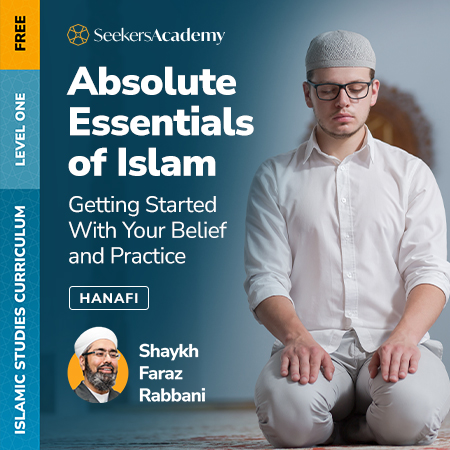
The Prophet said that, “Whoever travels a path to seek knowledge, Allah facilitates for them a path to Paradise.” (Muslim) This course is the first step in your pursuit of religious knowledge. It explains what your religion is; what you must know about it; and how you should learn it.
This course covers what every Muslim must know about the basic guidance of Islam in its three dimensions: (1) beliefs (iman)—and how to have sound belief in Allah, His Prophets, and the Hereafter; (2) submission (Islam)—how to make your purification and prayer valid, sound, and proper; and (3) spiritual excellence (ihsan)—by looking at key sins and vices to avoid, and key virtuous actions and traits to uphold, in seeking closeness to Allah.
This course is taught according to the Hanafi school. If you would like to learn it according to the Shafi‘i school, take this course instead.
- Teacher: Shaykh Faraz Rabbani
This course is based on The Absolute Essentials of Islam: Faith, Prayer, and The Path of Salvation According to the Hanafi School, by Shaykh Faraz Rabbani (White Thread Press).
This book covers what every Muslim must know about the basic guidance of Islam in its three dimensions: (1) beliefs (iman)—and how to have sound belief in Allah, His Prophets, and in transmitted beliefs; (2) submission (Islam)—by looking at the daily devotional obligation of ritual prayer; and (3) spiritual excellence (Ihsan)—by looking at key sins and vices to avoid, and key virtuous actions and traits to uphold in seeking closeness to Allah.
“I know of no other manual of Islam that presents the essentials of the Hanafi school and basic Islamic belief so reliably, concisely, and elegantly as The Absolute Essentials of Islam. Faraz Rabbani is to be commended for producing a work from which the new Muslim can learn, the practicing Muslim check his fiqh, or the student merely curious about the practice of Islam see how it all fits together. It is likely to serve the Ummah, Allah willing, as long as there are English-speaking Muslims in it who want to know their din. This book works.” – Shaykh Nuh Keller, Jordan
- This is the first course in Level One.
- This course has no prerequisites.
- Any student who wants to learn about the basics of belief and worship and wants to start their journey of gaining sacred knowledge should start with this course.
- Understand how to seek religious knowledge
- Learn the basics of Islamic beliefs: so you know what we believe about Allah, His Messengers, and the Hereafter—and why
- Learn how to make your daily worship—purification and prayer—valid, sound, and proper
- Learn how to worship Allah Most High with sincerity
- Learn essential guidelines for living a faithful, upright life